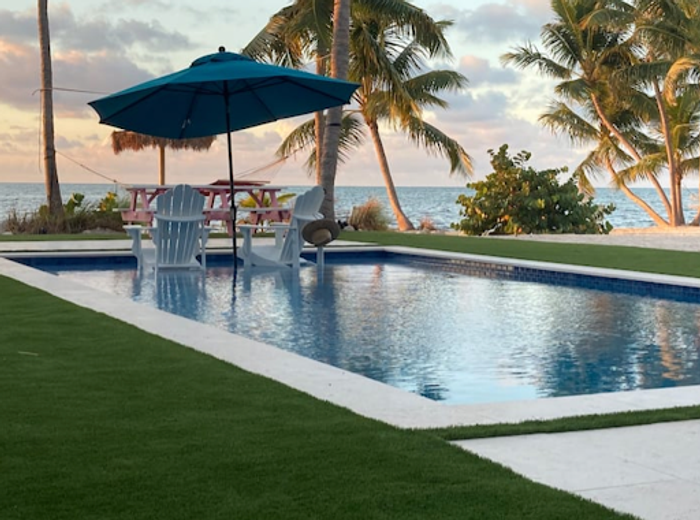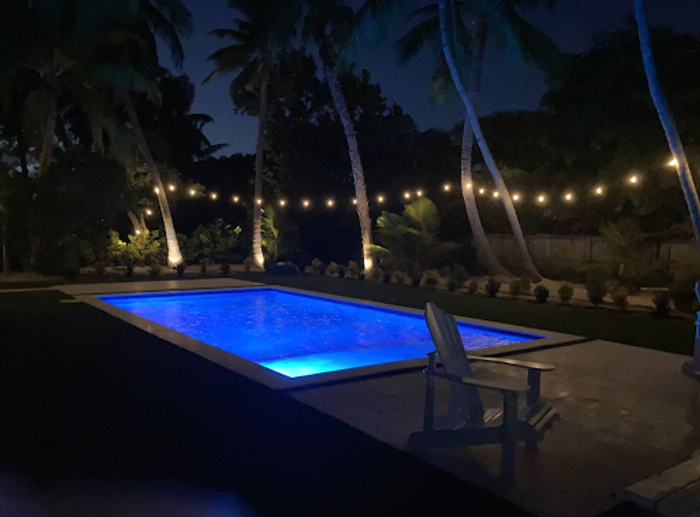This article is reprinted by permission from The Escape Home, a newsletter for second homeowners and those who want to be. Subscribe here. © 2022. All rights reserved.
Who doesn’t love a pool in the summer? Rental properties with swimming pools are in high demand on platforms like Airbnb, and hosts are often able to charge a premium. But fluffy towels and comfortable chaise lounges aside, having a pool comes with a fair share of headaches — and liability. A majority of drownings in at-home pools in the United States are by children between the ages of 1 and 4. What liability do owners face if a pool-related injury occurs on their property? The Escape Home’s Angelina Nelson has the scoop.
Airbnb offers Host Liability Insurance (HLI) which covers specific bodily injuries, including certain swimming-related incidents. However, hosts should not solely rely on this insurance to cover all of the liabilities that come with having a pool on your property.

Borrero’s pool at her Airbnb in Islamorada, Florida.
Airbnb
Short-term rental insurance insurance is a must
Denira Borrero has multiple properties listed on Airbnb in Florida. She recently installed a pool at her property in Islamorada, and is now able to charge 20% more for each stay. While she earns more, she has also had to take additional steps to ensure that every liability is covered.
To make sure her property is covered she uses short-term rental insurance. This is separate insurance from Airbnb’s HLI. Borrero found this insurance company on her own and made sure that the clauses cover everything on her properties, including pool incidents. Her properties are listed on multiple platforms including VRBO. Having her own insurance makes it possible for her to protect her property regardless of what platform her guests used to make the booking. She encourages other hosts to make sure that they take this step and do their research on short-term rental insurance.
“Insurance is very local by state and municipality so it’s hard to broad-stroke it,” she says. “It’s definitely something I would recommend because you can’t broad-stroke it, you need to do your own investigation.”

Borrero’s pool at her Airbnb in Islamorada, Florida.
Airbnb
With her short-term rental insurance, she now has contracts and pool safety rules listed for her guests in case they decide to use the pool. Some other steps she suggests taking are ensuring you have a contract for pool usage and proper signage such as one that says “swim at your own risk.”
Despite the added liability, Borrero still encourages owners to have a pool on their property. The added profit from having a pool on her property also makes up for the expenses from having short-term rental insurance.
“There’s pros and cons to having a pool,” Borrero added. “Particularly if you are in a warm climate, a pool will increase the demand for your property. It will allow you to command a higher rental rate. Plus, you can enjoy it yourself.”
No diving boards, floaties or slides
Maryland-based Proper Insurance provides coverage for short-term rentals. Nick Massey, director of sales, strongly recommends that hosts avoid having a diving board, pool toys and slides. When these are on the property, it increases the chance of a guest or child injuring themselves.
“We do not allow any type of pool toys, floaties, or inflatables around the pool to be offered,” he says. “That just entices somebody who doesn’t know how to swim to engage in swimming activity.”
When offering a pool as an amenity, details matter. Similar to having the proper signage, all pools should have depth markers. While this may not seem important, it plays a large role in a host’s liability.
“We understand what the attorneys are looking for when they sue property owners,” Massey says. “The major thing that we do is that we require that pools have depth markers on all sides. We require that the property includes rescue equipment like a shepherd’s crook or nautical life ring.”
Bryce Dees, a licensed agent at Marshall Insurance in Florida, says being digilant is of the utmost importance. very important.
“Putting a kiddie gate around the pool, that’s just one more step if you’re going to court that you can say that you took in order to alleviate any issues,” he says. “That’s on the parents. They left the kiddie gate open and that’s why the kid fell in the pool.”
Dees also recommends having cameras around the pool. If you are being sued, it is easier to rely on camera footage for more concrete evidence. This, along with having short-term rental insurance, is often overlooked by Airbnb hosts.
Consider taking a safety course
Another tool that can be used in pool safety is the International Home Association of Certified Home Inspectors’ Pool and Spa Safety Inspection Course. This course, recommended by Jaffe, teaches homeowners how to inspect for pool safety through 36 hours of quizzes, course material and exams.
Recently, Airbnb partnered with Safe Kids Worldwide, a nonprofit dedicated to protecting children from preventable injuries, to help promote pool safety for its hosts and guests. The aim of the partnership is to offer safety tips to hosts such as securing all access points to the pool or providing guests with the Safe Kids Worldwide pool safety checklist. Some of the tips include making sure older kids swim with a partner and installing fences around pools. Pool gates are also offered to hosts at a discount to help create a safer environment for guests.
Airbnb hosts should be taking all of these steps to ensure that their property is not only safe, but also insured in case there is an incident. An additional step that can be taken is encouraging guests to use Safe Kids Worldwide’s Water Watchers program. The Water Watchers program works by using a card that is given to a responsible adult to wear. The adult takes the responsibility of actively supervising the children who are using the pool.
Inspections are crucial
And lastly, don’t forgo inspections.
Richard Jaffe, a trained EMT and personal injury lawyer at Cohen & Jaffe, strongly urges all pool owners, whether or not they are renting out their home, to have their pool checked out by a professional.
“Certified safety experts have the knowledge and foresight to anticipate what really can happen when you can’t anticipate those things,” he says. “So instead of relying upon your common sense to find the defects and find the problems that may occur, it’s better to rely upon the experts who have already been through this and have the expertise to tell you what you can do to help yourself in guarding against the loss of life and any accidents that may occur.”
This article is reprinted by permission from The Escape Home, a newsletter for second homeowners and those who want to be. Subscribe here. © 2022. All rights reserved.
